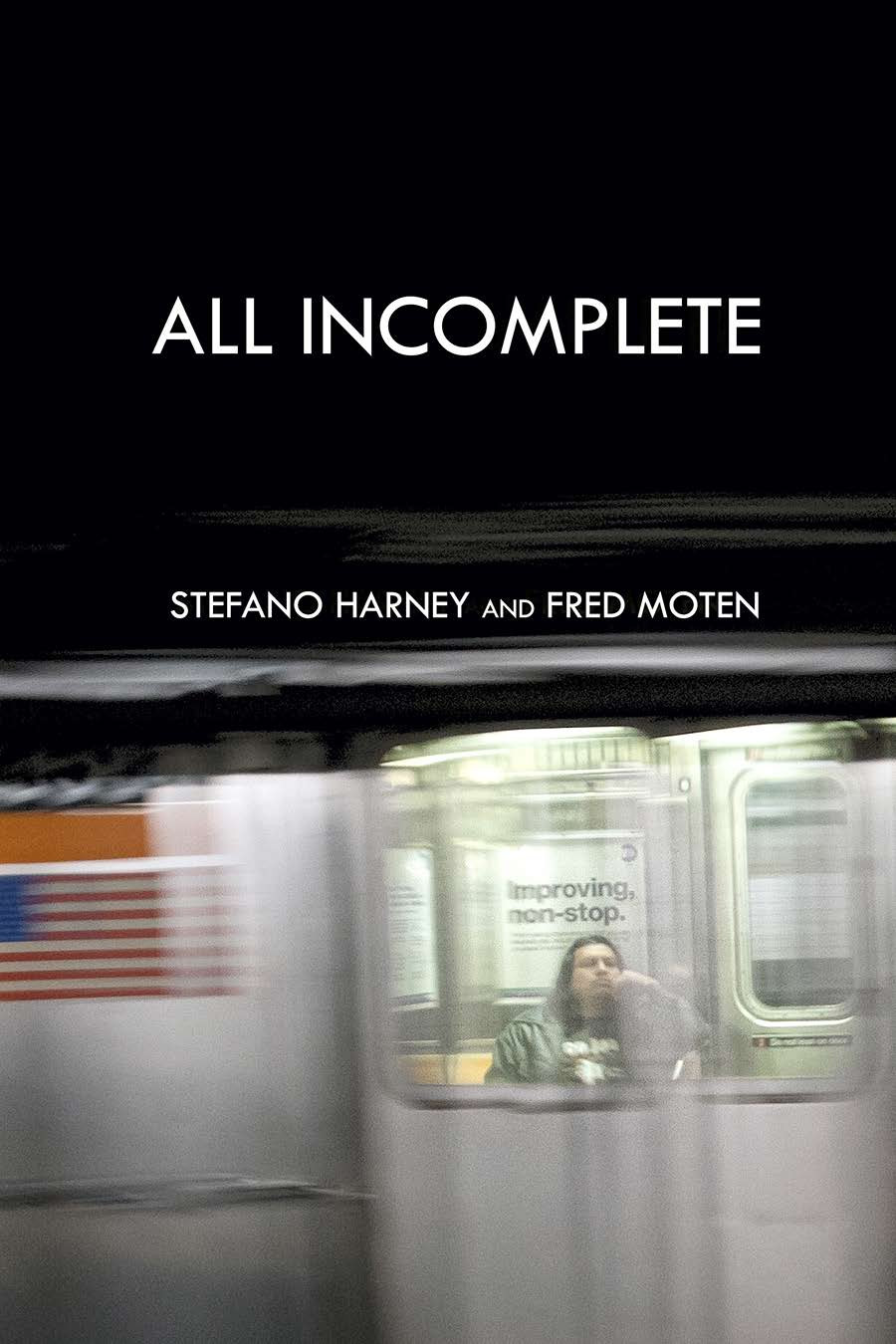Stefano Harney, Fred Moten: All Incomplete (2021)
Filed under book | Tags: · assembly, individuation, logistics, sovereignty

“Building on the ideas Harney and Moten developed in The Undercommons, All Incomplete extends the critical investigation of logistics, individuation and sovereignty. It reflects their chances to travel, listen and deepen their commitment to and claim upon partiality.
All Incomplete studies the history of a preference for the force and ground and underground of social existence. Engaging a vibrant constellation of thought that includes the work of Amilcar Cabral, Erica Edwards, Denise Ferreira da Silva, Cedric Robinson, Walter Rodney, Hortense Spillers and many others, Harney and Moten seek to share and understand that preference.
In so doing, Moten and Harney hope to have forged what Manolo Callahan, echoing Ivan lllich, calls a convivial tool that — despite the temptation to improve and demand, develop and govern, separate and grasp — helps us renew our habits of assembly.”
Foreword by Denise Ferreira da Silva
Photos and Afterword by Zun Lee
Publisher Minor Compositions, Colchester, 2021
Open access
ISBN 9781570273780, 1570273782
178 pages
Reviews: Andrew Brooks (incl. mixtape, Sydney Review of Books, 2022).
Comment (0)Michael Hardt, Antonio Negri: Assembly (2017)
Filed under book | Tags: · activism, assembly, autonomy, colonialism, commons, democracy, entrepreneurship, finance, labour, multitude, neoliberalism, organization, politics, protest, social movements, subjectivity

“In recent years ‘leaderless’ social movements have proliferated around the globe, from North Africa and the Middle East to Europe, the Americas, and East Asia. Some of these movements have led to impressive gains: the toppling of authoritarian leaders, the furthering of progressive policy, and checks on repressive state forces. They have also been, at times, derided by journalists and political analysts as disorganized and ineffectual, or suppressed by disoriented and perplexed police forces and governments who fail to effectively engage them. Activists, too, struggle to harness the potential of these horizontal movements. Why have the movements, which address the needs and desires of so many, not been able to achieve lasting change and create a new, more democratic and just society? Some people assume that if only social movements could find new leaders they would return to their earlier glory. Where, they ask, are the new Martin Luther Kings, Rudi Dutschkes, and Stephen Bikos?
With the rise of right-wing political parties in many countries, the question of how to organize democratically and effectively has become increasingly urgent. Although today’s leaderless political organizations are not sufficient, a return to traditional, centralized forms of political leadership is neither desirable nor possible. Instead, as Michael Hardt and Antonio Negri argue, familiar roles must be reversed: leaders should be responsible for short-term, tactical action, but it is the multitude that must drive strategy. In other words, if these new social movements are to achieve meaningful revolution, they must invent effective modes of assembly and decision-making structures that rely on the broadest democratic base. Drawing on ideas developed through their well-known Empire trilogy, Hardt and Negri have produced, in Assembly, a timely proposal for how current large-scale horizontal movements can develop the capacities for political strategy and decision-making to effect lasting and democratic change. We have not yet seen what is possible when the multitude assembles.”
Publisher Oxford University Press, 2017
Heretical Thought series
ISBN 9780190677961, 0190677961
xxii+346 pages
Reviews: Publishers Weekly (2017), Christian Fuchs (triple-C, 2017).
Comment (0)Craig Buckley: Graphic Apparatuses: Architecture, Media, and the Reinvention of Assembly 1956-1973 (2013)
Filed under thesis | Tags: · architecture, assembly, collage, history of architecture, machine, media, montage
“This study examines the work of a number of architects who sought to rethink the physical, visual, and historiographic problems of assembly at a moment when the discipline was being destabilized by changing cultural politics and the proliferation of new electronic media.
Through a series of case studies, it analyzes buildings, images, publications, prototypes, and films made from the late 1950s to the early 1970s by architects in London (Theo Crosby and Edward Wright), Vienna (Hans Hollein, Gunther Feuerstein, Walter Pichler), Paris (the Utopie group), and Florence (the Superstudio group).
I argue that during these years the making of composite images was intensely identified with imagining new forms of construction, a dynamic informed by concepts of montage pioneered by the historical avant-gardes. Rather than compare postwar experiments to those of the 1920s, the dissertation considers how emerging media practices responded to the absorption of montage into postwar mass culture. The rethinking of montage paralleled a changing attitude toward machines, in which an earlier 20th-century ambition to master mechanization through design and prefabrication gave way to an attitude emphasizing a more flexible combination and rearrangement of parts, materials, and concepts drawn from a wide range of sources. Assembling an image out of disparate photomechanical elements graphically enacted the manner in which architects imagined appropriating technologies and materials from outside the domain of architecture in a bid to transform the discipline. During these years architects engaged montage as a mode of working both within and against the space of architectural publicity; one that was less illustrative than it was performative.
If efforts to reinvent problems of assembly aimed to shift discourse within the discipline, they were also shaped by changes in the technological apparatuses of mechanical reproduction, notably the displacement of industrial letterpress by photo-offset lithography. In retrospect, grasping changing ideas of assembly helps to comprehend how during these years the status of building shifted within architectural culture, while also prefiguring how habits of “cut and paste,”–the continual combination and alteration of ready-made visual material–would become central to the operational culture of digital tools in our own time.”
Publisher Architecture Department, Princeton University, 2013
Advisors: Beatriz Colomina and Spyros Papapetros
316 pages
PDF (12 MB)
Comment (0)
